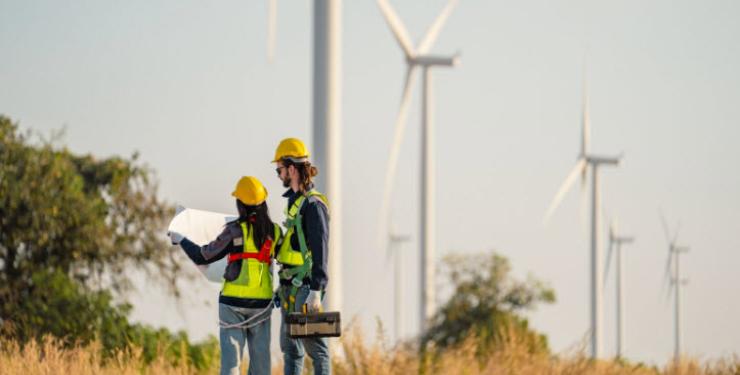From Local Skills to Global Impact: The International Reach of Wind Turbine Technician Training
The fact that wind energy is among the fastest growing renewable energy sources means that as an industry, it is also among the most lucrative in terms of opportunity and growth. Though the number of Wind Turbine Technician jobs is growing quickly year over year, ambition, technical aptitude, and a willingness to work at heights is not enough to open many doors.
Like any other skilled profession, Wind Turbine Technicians must develop their skills through a combination of qualified theoretical and practical hands-on training courses. Those who complete such programs are well poised to obtain meaningful employment. In this article, we’ll highlight the importance of Wind Turbine Technician training, the benefits of earning internationally accepted certificates, and provide some tips on making sure your skills remain up to date in this quickly evolving industry.

Why Wind Turbine Training is Important
By all accounts, renewable energy sources, wind energy in particular, have begun to show real promise as a comparable, fiscally sound alternative to traditional sources of electricity. This of course means that the demand and appetite for clean energy is growing, as is the need for skilled wind turbine technicians. As with any other skilled profession, one cannot simply apply and hope for the best; proper training is not only necessary to ensure the applicant has the necessary skills to fulfill the basic job requirements, they are vital to ensuring the safe and efficient installation, operation, maintenance, and repair of the ever growing number of wind turbines that dot the landscape.
Fortunately, individuals that are determined to make their way in the industry can improve the quality of opportunities available to them by investing in comprehensive training programs. In so doing, not only will they expand upon their skills, they will also position themselves in such a way as to remain agile to growth and changes within the renewable energy sector. In order to begin a career as a wind turbine technician there are several core areas in which an applicant should be proficient. These include:
- Familiarity with electrical systems. If you’re going to be working with and around wind turbines, it stands to reason that your success will depend on the degree to which you are familiar with the various components. For example, knowledge of a wind turbine’s electrical systems will allow you to diagnose and resolve electrical issues relating to the generation and transmission of energy from the site.
- Familiarity with mechanical systems. Similarly to having a working understanding of a wind turbine’s electrical components, understanding how to work with things like gearboxes, rotors, bearings, etc. is vital to performing the general maintenance and repair of a turbine’s mechanical components.
- Safety methodologies. Safety while on site is of the utmost importance, especially when considering the bulk of a wind turbine technician’s work is completed at the top of the tower, within the confines of the nacelle. Having knowledge of the safety protocols that must be followed is imperative, and is a focal point of most if not all wind turbine training programs and courses. This knowledge includes but is not limited to, the use of adequate personal protective equipment (PPE), identifying hazards, and working at heights.
- Maintenance and problem diagnosis. Having the ability to properly diagnose and resolve issues, as well as maintain the various systems within a wind turbine is a crucial part of any technician training program. Employers will seek out and retain technicians that have the skillset to limit any unplanned downtime that could impede a turbine’s energy generation.
Data monitoring and analysis. A skilled technician should be proficient in the use of digital technologies used to monitor turbine operations and be able to analyze the data. Fortunately, most training programs incorporate this skillset into the course material, as more and more wind turbine operations are equipped with digital technologies and robust monitoring platforms.
Wind Turbine Training Certificates
The importance of obtaining a wind turbine technician training certificate is twofold. First, it tells potential employers that you have learned the skills necessary to successfully service and maintain the equipment used by wind turbines. The second is, depending on the type and number of certificates that you earn, they can make you a more desirable candidate, and increase the number of opportunities available to you. For example, completing an entry level certificate program can certainly be enough for you to secure employment, however, studying for and earning subsequent certificates will enhance your skill set and increase your employability. Everything else being equal, an employer will undoubtedly prioritize candidates who have earned a number of related certificates over those with fewer.
How to Keep Your Skills Up To Date
Completing a wind turbine technician training certificate is a great start to ensuring employability but, as with any other skilled profession, you’ll want to make sure that you devote some time to keeping your skills up to date. Granted, finding time and energy to do this can be difficult, but there are ways to make it easier on yourself. Here are a few tips.
Spend a bit of time monitoring any trends that could impact your industry. Wind generation is a growing segment of the clean energy sector, so there is quite a bit of information to parse. In particular, you may want to keep abreast of things like new turbine technologies, blade design, legislative announcements, proposed site development, etc. Generally speaking, reading the occasional industry journal or attending industry conferences are good sources of relevant information.
Next, look for ways to enhance your skill set. Consider enrolling in a training course or program that covers related information like energy storage solutions, hydraulic systems, grid integration, electrical systems and so on. Every bit of knowledge gained, if well thought out, could lead to bigger and better opportunities down the road.
Be willing to embrace digital technologies. Though you may think that wind turbines are relatively “low tech” the reality is that the wind industry as a whole is navigating more and more to digital tools and solutions. These range from design, simulation, and operation programs to data collection and analysis.
Lastly, be open to the fact that relocation may be something that happens from time to time. Being flexible in your willingness to relocate to work on new projects is something that many employers consider invaluable.
Wind Turbine Training is the Key to Obtaining Work as a Technician
In this highly competitive job market, it isn’t enough to simply want your desired profession - you have to put in the work to hone your skills. To be successful as a Wind Turbine Technician, whether at home or abroad, it’s important that you’ve received qualified training, earned certifications, and made an effort to keep your skills current. If you’d like to learn more about becoming a Wind Turbine Technician, speak to a program coordinator at George Brown College today.
